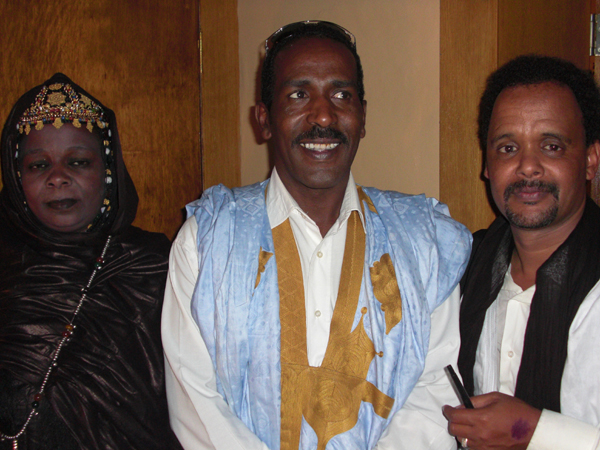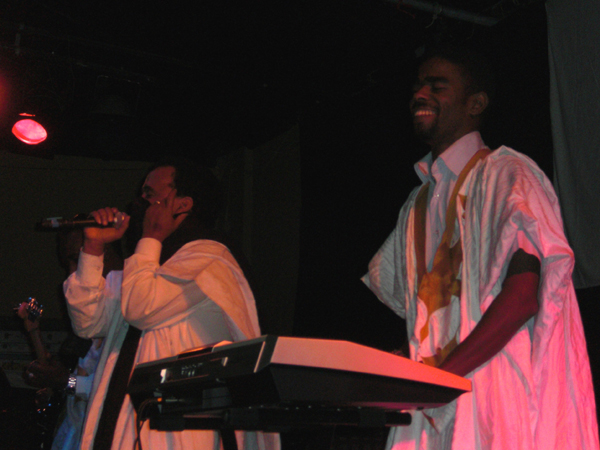
HOME REVIEWS CONTACT LINKS ARCHIVES FORUMS
 |
| HOME REVIEWS CONTACT LINKS ARCHIVES FORUMS |
 |
It's hard to imagine what the four Muslim members of Group Doueh thought about their first gig outside Western Sahara, playing inside an Anglican church that served cold lager within the gay neighborhood of one of the most flamboyantly gay cities in Europe, Brighton, England. A couple of hours beforehand, Terminal Boredom got a few moments to sit down with the band in the church basement after sound check as the musicians ate takeout chicken and tabouli. Sublime Frequencies Co-founder Hisham Mayet translated from English to Arabic and back: vocalist Bashiri Touballi provided answers on the band's behalf while guitarist Salmou "Doueh" Baamar stood squarely in front of and pointed a video camera directly at their English-language-only interviewer. Outside, a peculiar mix of middle-aged, upper-middle-class world music fans and scruffy weirdos on drugs lined up -- an audience peculiar for most bands, sure, but not a Sublime Frequencies one. |
 |
Terminal Boredom: What opportunities to witness live music are available to the Sarahawi (people of Western Sahara)? TB: Your music strikes me as cathartic and hypnotic: is there a religious influence? TB: How do you feel about playing for Western secular audiences, particularly when alcohol is being served? TB: It has been mentioned that you have been approached by several record labels -- why did you decide to have your albums released by Sublime Frequencies? TB: You cite a few Western musical influences: when and how did you hear Jimi Hendrix? TB: What place would you like to visit, as a touring musician, that you have never visited? TB: Do you like the Western food you've sampled so far? What do you miss most from home? |
 |
 |
Terminal Boredom: How does a Seattle label "discover" bands in Western Sahara and Syria? TB: Why do you not re-press the sold-out vinyl LPs? TB: Does Sublime Frequencies have a "Mission Statement" or do you more just "follow your ear" toward musical delights? TB: What is your personal favorite Sublime Frequencies album or song? TB: What Sublime Frequencies album do you feel would mostly have been relegated to obscurity, at least among a world audience, had it not been released? TB: Is this the first Sublime Frequencies-organized tour? Was it as complex or more complex than you had anticipated? TB: Have there been particular difficulties associated with helping Muslims travel through Western countries? TB: Do you feel regulated world travel - passport control, border control, etc. - is as easy or difficult as it should be? TB: What particular country to which you have travelled elicited the most "culture shock?" TB: Any future projects we should know about? |
 |
Visit Sublime Frequencies online. Text and photos by Deke Dirt |
| PREVIOUS PAGE HOME NEXT PAGE |